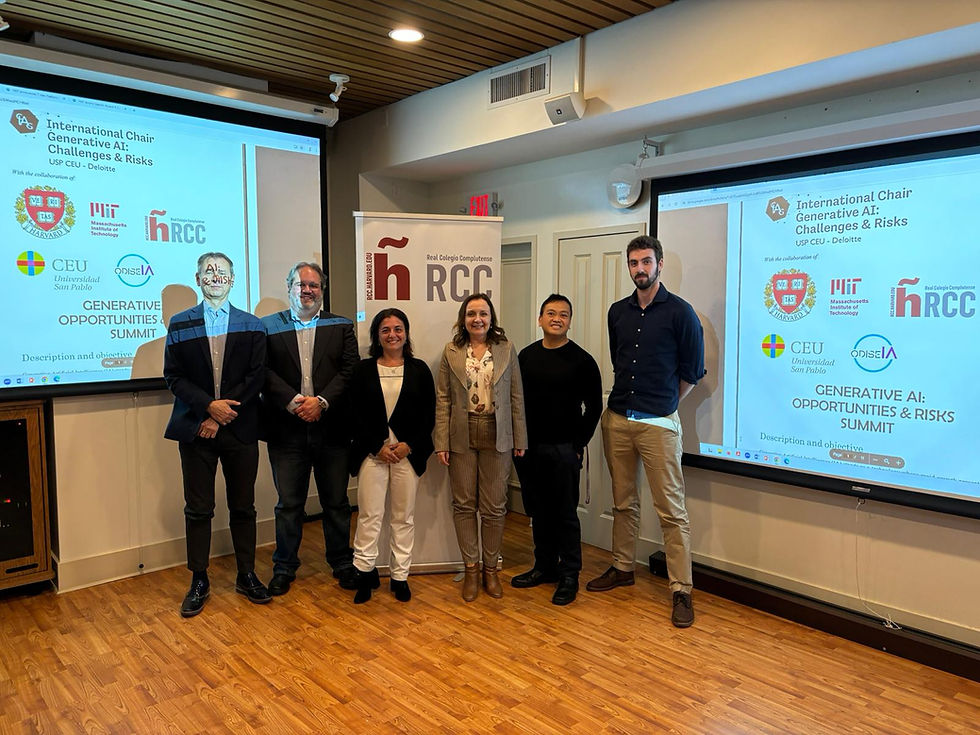ORIGIN International Chair 'Generative AI: Challenges and Risks'
- Miguel Ángel Liébanas

- Jul 24, 2025
- 3 min read
The emergence of Generative Artificial Intelligence (GAI) has triggered a profound transformation that we are already experiencing. From its impact on education, healthcare, law, and communication, to its ethical, social, and legal implications, GAI poses a horizon full of challenges... and risks. Aware of this reality, CEU San Pablo University, in collaboration with Deloitte and prestigious international universities and organizations, is promoting the International Chair "Generative AI: Challenges and Risks," a pioneering project whose objective is to anticipate, understand, and responsibly guide the effects of this technology.
What is this Chair and why is it relevant?
The Chair was born in response to the rapid development and adoption of tools such as ChatGPT and DALL·E, which are already actively influencing the public and private sectors. Its approach is not only theoretical but deeply practical and results-oriented.
Three axes structure the Chair:
Fundamental Research : where the ethical, legal and social impacts of IAG are studied.
Experimental Development : focused on the creation of technical tools for the monitoring and interpretation of generative systems.
Dissemination and communication : aimed at educating citizens, raising awareness, and creating a community around ethical and transparent AI.
Research with real impact
This first line of work is deployed in thematic packages that address:
Ethical and social impact , including studies on algorithmic discrimination, fake news, and the influence of AI on the metaverse.
Legal implications , such as intellectual property or privacy.
Social transformations , analyzing everything from changes in personal relationships to their impact on vulnerable groups.
More than 30 activities are already underway , involving experts from CEU, MIT, the University of Buenos Aires, Loyola University of Andalusia, and organizations such as OdiseIA and Women in a Legal World. All of this is based on the premise that technological advances must go hand in hand with ethics and respect for human rights.
Technology at the service of transparency
How do you know what an AI model "understands" when generating content? What risks arise from not being able to monitor this internal knowledge?
The Chair is committed to developing a technical suite for the explainability and interpretability of generative models . This platform will allow, among other things:
Analyze the embeddings of generative systems.
Detect unwanted changes during retraining.
Visualize and monitor concepts learned by AIs.
This technological development, led by Miguel Ángel Liébanas' team, will be AI vendor-agnostic , accessible, and open to collaboration with the research and technical community.
Bringing AI to society
The third pillar of the Chair has a clear objective: to bring knowledge to the public and promote an informed and critical image of the IAG.
Includes:
Training programs for different audiences, tailored to age, digital literacy level, etc.
Webinars, workshops, and ongoing educational content on the website.
GenIA Awards , which will recognize ethical and transformative initiatives in the field of AI.
A robust digital strategy : social media, SEO, content marketing, and a dynamic web platform in multiple languages.
An international network of alliances
The Chair has collaboration agreements with entities such as:
MIT (SERC) , UBA , Universidad Austral , Global AI Ethics Institute …
And at the national level: OdiseIA , Microsoft Ibérica , Narrativa , DigitalES , Mutualidad de la Abogacía , among many others.
Furthermore, figures such as Dafna Feinholz (UNESCO) and Leva Martinkenaite (European Commission) serve on the advisory committee, ensuring the Chair's alignment with the most demanding international standards.
%20B.png)


Comments